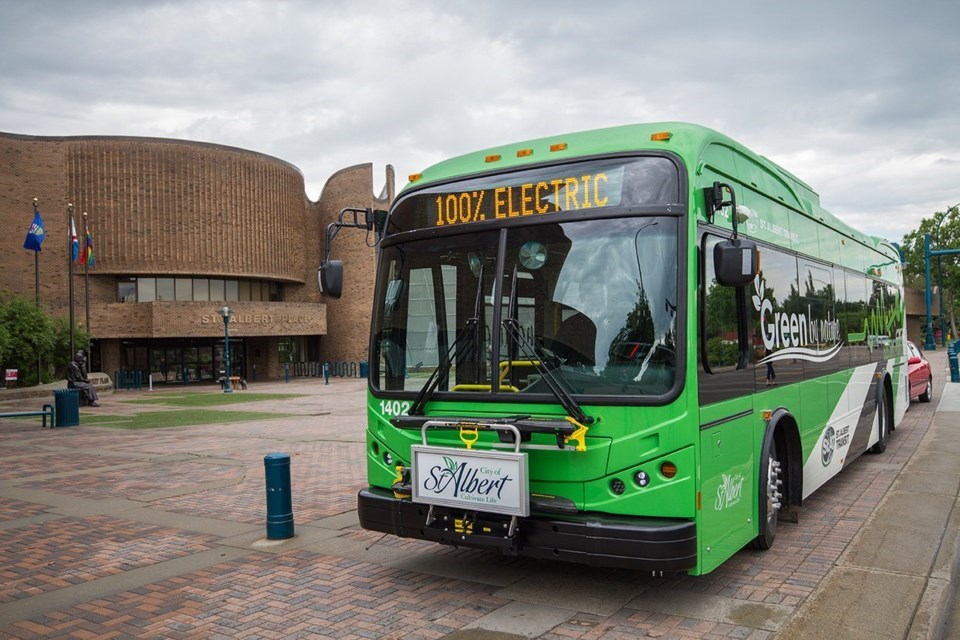St. Albert taxpayers could be on the hook for more than the recently released 2023 draft budget suggests, pending the approval of the first phase of delivery for regional transit services.
On Oct. 24, chief administrative officer (CAO) Bill Fletcher presented the city’s proposed budget, which includes a 4.6-per-cent tax increase, equating to an extra $175 per year in taxes for the average house costing $450,000. However, Fletcher noted the draft budget does not yet include the cost of bringing on regional transit, which the city estimates could result in an additional one-to 1.5-per-cent tax impact.
This estimated impact reflects the costs of an entire year of operation, and therefore may not fully be applied in 2023 as regional transit service is scheduled to begin mid-way through the year.
The Edmonton Metropolitan Transit Services Commission (EMTSC) released its service plan in September, outlining 11 routes throughout the Edmonton region that will make up the first phase of regional transit services.
Other than Edmonton, how much each additional member municipality will pay has yet to be finalized, with current timelines projecting commission budget approval on Nov. 17.
“We do not have firm concrete numbers to put before you today,” Fletcher told council Oct. 24, adding administration is working with the transit commission.
Coun. Sheena Hughes said in an interview she appreciates Fletcher noting the anticipated costs of regional transit.
“He did offer as much transparency as he could,” Hughes said.
However, Hughes said it is “concerning” that as a member of the commission, the city will have to sign off on the amount the commission decides in order to get the ball moving on regional transit.
“We actually have nothing to deliberate, we just have to write the cheque,” Hughes said. “Which is obviously concerning.”
Coun. Wes Brodhead, who serves as chair of the transit commission, said having to factor the cost of regional transit into the budget later in the season is “a difficult situation to be sure.”
He noted costs that will factor into member municipality’s requisitions will include repaying debt used to get the commission up and running.
However, he said St. Albert will find benefits due to the pooled resources the commission brings, giving the example of the commission’s customer service.
“There is a benefit to St. Albert as a result of that, and that number will be made available as well,” Brodhead said. “So while it’s not all doom and gloom … it just comes at a unique time in history when a whole bunch of horses are coming to bear.”
St. Albert is one of eight member municipalities belonging to the commission, with other members including the cities of Edmonton, Fort Saskatchewan, Spruce Grove, and Leduc, as well as the towns of Beaumont, Stony Plain, and Devon.
The service plan released in September includes four lines that connect with St. Albert: Metro Northwest 1, which runs from St. Albert Exchange, down St. Albert Trail to Government Centre in Edmonton; Metro Northwest 2, a direct route from St. Albert to NAIT; Metro Northwest 3, which runs from St. Albert Exchange along St. Albert Trail and Groat Road to the University of Alberta; and Metro Cross, which connects Nakî Transit Centre to the West Edmonton Mall, later running to Edmonton’s Clareview Transit Centre.
Coun. Ken MacKay said council will have to consider alternatives if they want to keep the 2023 tax increase down and may have to explore options.
One example he gave would be cancelling the automatic 1.5 tax increase council approved in 2019 to go towards repairing, replacing, and maintaining (RMR) city infrastructure.
MacKay likened forgoing the RMR increase to failing to change the oil filter on a car and then having to pay to replace the whole engine in terms of long-term costs.
“I’m personally not interested in removing the 1.5, but there may be other councillors that are willing to look at it,” MacKay said.
Council budget discussions are set to continue this Thursday at a 2 p.m. council meeting. The meeting will be streamed online, and open to the public for in-person attendance.




